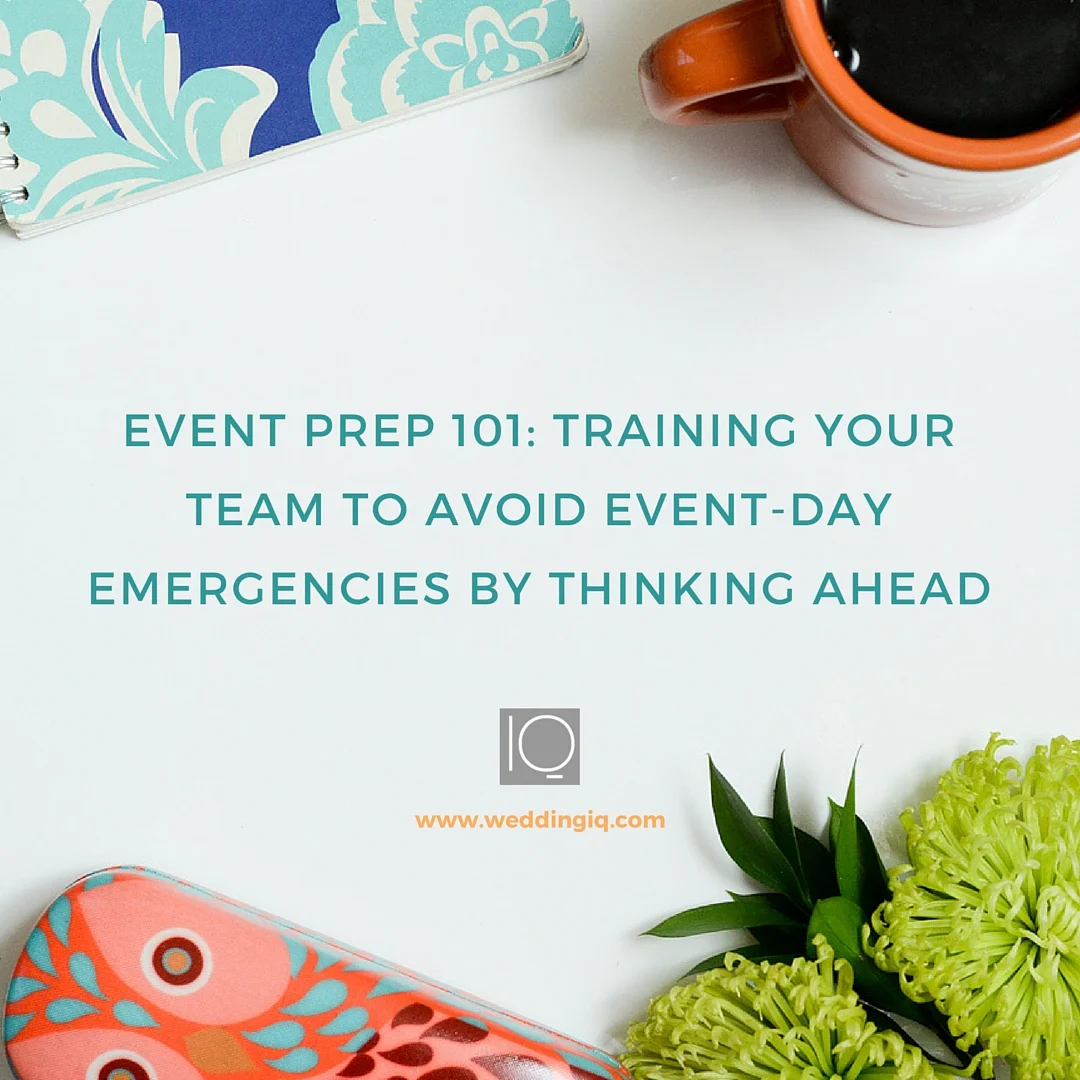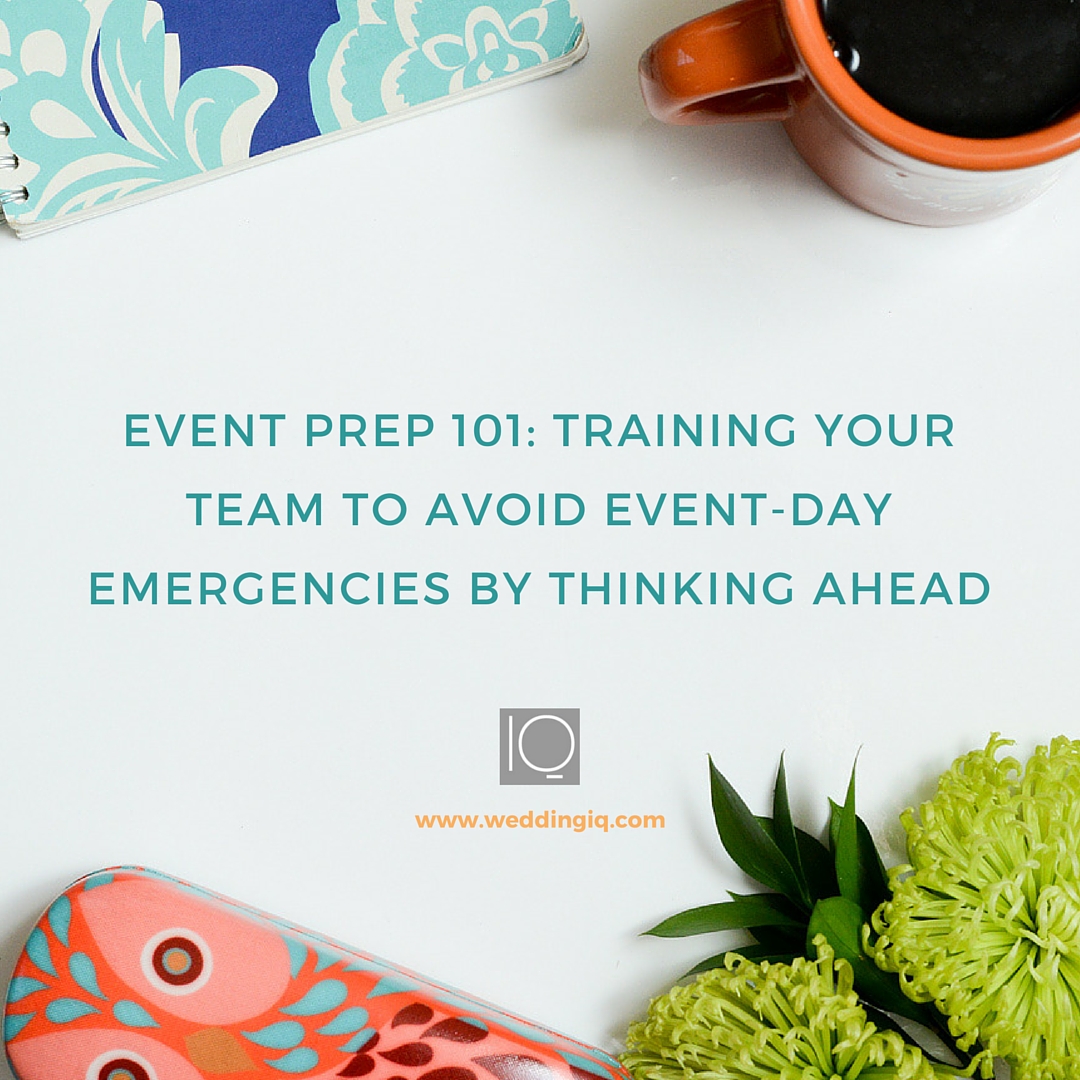Event Prep 101: Training Your Team to Avoid Event-Day Emergencies by Thinking Ahead
As business owners, we tend to be full of passion and dedication to our work, and it's easy to assume that everyone we hire will feel exactly the same way. Unfortunately, this is a common mistake that often leads to under-training our team, a shortcoming we don't even realize until something terrible happens at a wedding and we're left to answer for it.
Sure, most of us with employees or contractors are fortunate enough to have fantastic, loyal, talented people representing our business. As I've often said at speaking engagements, though, other people will never be as invested in your business as you are. That's just a fact, and keeping it in mind as you plan your training will help you avoid many a headache along the way.
Starting today, and for the next two Mondays after, I'll be rolling out a three-part post series on properly training your wedding business' team to prepare for events, interact with other vendors, and address on-site emergencies, all in a way that reflects well on your brand and protects the professional reputation you've worked so hard to build.
Up first: helping your team to anticipate and proactively avoid event-day emergencies, through proper preparation.
Why Being Prepared Won't Come Naturally
As with passion and dedication, the kind of organization and critical thinking needed to work in this industry isn't something that's going to be as inherent to your team members as it is to you. For one thing, a wedding is a much higher-stakes event than most people are used to dealing with - if your team skews young, they may never have even attended a wedding as a guest prior to working for you (and if they have, it was most likely to dance, drink, eat cake and/or catch a bouquet - they certainly weren't thinking about all that can go wrong!). Before starting a career in weddings, your team members aren't likely to have considered the importance of these events to the clients you serve, or how many "moving parts" it takes to pull off a wedding successfully.
Another consideration is that, at least in most cases, wedding businesses just don't operate the same way as other businesses, and as most other jobs your team members will have had. Rarely can someone call in sick without consequence, and an honest mistake in execution can have a major impact not only on your business, but on the other vendors, the guests and the couple themselves. I can almost guarantee this is something your team won't be prepared for, unless you are the one guiding them in being prepared.
Because of this, you need to open their eyes, and you do this through your training. Communicate to your team exactly what's at stake - for your business' reputation, for your team members' career, and for the lifelong memories of the couples who are paying you - as you deliver your products and services.
Why Event-Day Emergencies Happen
Sure, sometimes you simply can't predict what will go wrong. Sudden losses of power, car crashes, alien abductions...those are the kinds of things that can't be predicted. Most event emergencies, however, are at least partly preventable. The emergencies happen because someone on the vendor team (or a combination of someones) simply wasn't prepared.
Maybe they didn't bring all the equipment they needed to execute their contractual obligations. Maybe they didn't schedule enough staff. Maybe they didn't communicate properly with the client leading up to the event day. Maybe they didn't leave enough time for travel, setup or just the basic formalities of the day.
When things go wrong because of one or more of these reasons, they more than likely were entirely avoidable. You as the business owner are in a position to help your team prevent these exact kinds of emergencies, just through good planning.
Giving Your Team the Right Information and the Right Tools
When it comes to creating a training program, I'm a big fan of dumbing it down: reducing the information to the clearest, most specific format possible, and assuming nothing when it comes to what my team already knows. Of course I have amazing people working for me, but by making my training program simple and direct, it eliminates misunderstandings and ensures me to train everyone the same way, regardless of experience level. What's more, my event prep training starts at the very beginning, and goes all the way through the event itself.
As you put together the training materials for your team, consider every possible demand on them (what they need to do, where they need to be, and what they need to plan) as they carry out their event-related duties, and address all of this in your training. In my opinion, no information is too basic to be included - the topics might include something like these:
- Step-by-step event-related preparation duties: in my DJ company, this includes pulling the requested music, practicing name pronunciation, and checking inventory of cables, tape and other accessories; for a photographer this might include charging batteries and gathering memory cards
- Basic life skills: think simple stuff like maintaining your car (and having backup transportation), using dual alarm clocks with AC power and batteries, remembering to pick up drycleaning before the day of an event, and so on
- Traffic taming: how to check and plan ahead for traffic conditions, especially for known "hot spots" in your area (here in my market, the Bay Bridge heading out to Maryland's Eastern Shore" is predictably a nightmare from May-September, requiring lots of extra travel time and some Jedi-level navigational tricks)
- Any particular potential pitfalls specific to your field: for example, if you know your delivery vehicles can be a nightmare to park, or if successfully executing an event depends on your team's interaction with other vendors, give them specific information on how to handle challenges as they come up
If you really want your team to be well-prepared, you might think about putting together a checklist they can work from, and a communication cheat-sheet showing them whom to contact if a question or potential event emergency does arise. (More on that later this month, when I show you how to develop a solid emergency backup plan for your wedding business!)
Simply by being realistic about your team members' natural level of dedication and organizational skills, and communicating your specific expectations when it comes to preparing for events (and step-by-step instructions for meeting those expectations), your wedding business can avoid the vast majority of event-day emergencies. Your team will feel more confident and empowered, and your stress levels will diminish significantly. That's totally worth the effort of putting together a little training guide, isn't it?
Next Monday, I'll be sharing tips for training your team on working alongside other wedding vendors. In the meantime, though, be sure to check back Wednesday for another event-day related post!
Want more of WeddingIQ? Snag your free subscription to The Editor's Cut, our monthly email newsletter packed with exclusive content. You'll also get access to The Sidebar, our private Facebook community. Click here to join the list!













